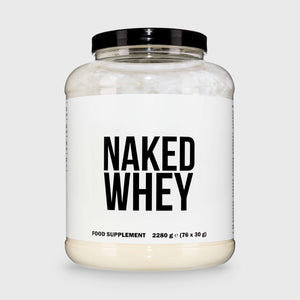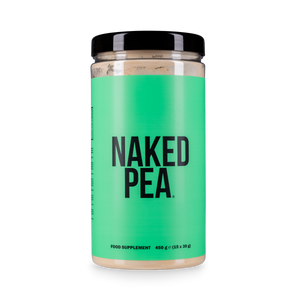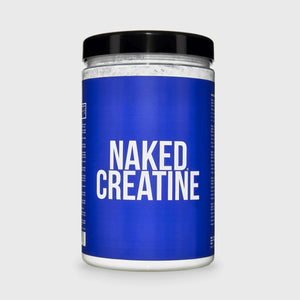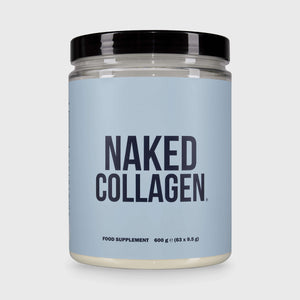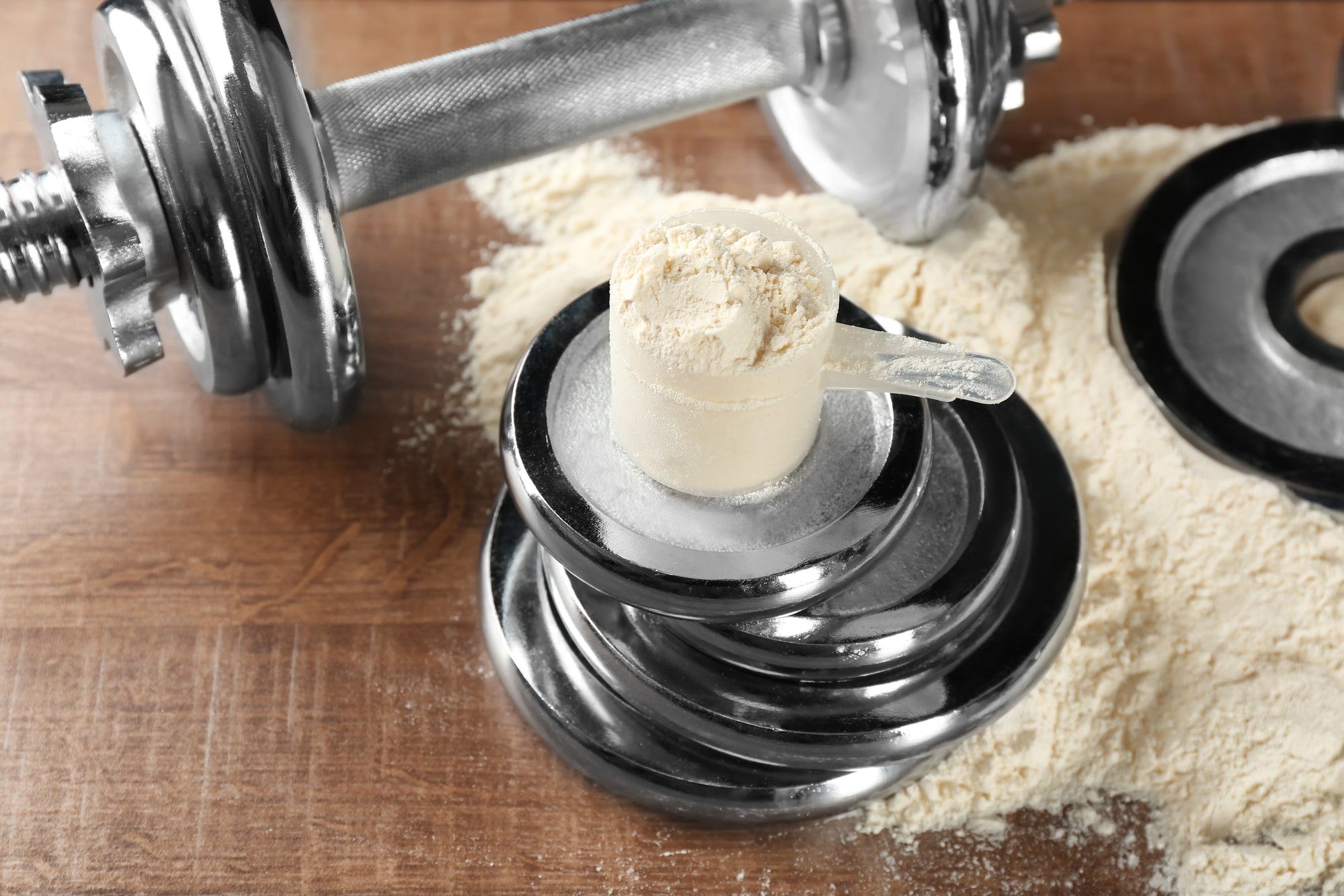
The bottom line: Research shows that creatine and HMB (β-hydroxy-β-methylbutyrate) are the most consistently effective supplements for increasing lean mass and strength gains, while traditional weight gainer powders offer limited benefits beyond what adequate nutrition can provide.
For most people seeking healthy weight gain, combining creatine supplementation with protein-carbohydrate blends and resistance training delivers superior results compared to relying solely on high-calorie powders [1, 2, 3].
What Actually Works for Healthy Weight Gain According to Research?

Many people wonder whether commercial weight gainer supplements are truly necessary for building muscle and gaining weight.
Let's take a look at what nutritional science reveals about the most effective approaches to healthy weight gain and which supplements actually support your goals.
If you've ever felt overwhelmed by the marketing claims surrounding weight gain products, you're not alone.
The supplement industry often promotes high-calorie powders as essential for muscle building, but research tells a different story about what your body actually needs to optimize lean mass gains.
Here's what research shows about effective weight gain strategies:
Studies demonstrate that creatine supplementation provides the strongest evidence for supporting lean mass increases, with typical gains of 1 to 2 kilograms in the first few weeks of use.
However, much of this initial weight increase comes from enhanced water retention in muscle cells rather than new muscle tissue alone [1, 2].
HMB supplementation shows moderate evidence for supporting muscle growth by reducing protein breakdown and enhancing recovery from resistance training.
Research indicates that HMB may be particularly beneficial during periods of intense training or caloric restriction [1, 2].
Traditional protein powders offer support primarily when dietary protein intake falls short of requirements, but most people can meet their protein needs through whole food sources without supplementation [1, 3].
|
Supplement Type |
Evidence Strength |
Primary Benefit |
Typical Weight Gain |
|
Creatine |
Strong |
Lean mass + strength |
1-2 kg (initial water retention) |
|
HMB |
Moderate |
Reduced muscle breakdown |
0.5-1 kg lean mass |
|
Protein powder |
Moderate |
Recovery support |
Variable (diet dependent) |
|
Carb-protein blends |
Moderate |
Hormonal optimization |
Supports muscle growth |
|
High-calorie powders |
Weak |
Calorie addition |
Often fat gain |
This means that effective weight gain focuses on specific compounds that enhance your body's muscle-building processes rather than simply consuming excessive calories through powdered supplements.
How Do Creatine and HMB Actually Support Muscle Growth?

So, how do these research-backed supplements work in your body to promote healthy weight gain? Understanding their biological mechanisms helps you optimize their use for maximum benefit.
Creatine enhances your muscle's energy production system by increasing phosphocreatine stores, which provide rapid energy for high-intensity muscle contractions.
Research shows that creatine supplementation allows for more repetitions per set and faster recovery between training sessions, leading to enhanced training adaptations over time [1, 2].
This enhanced training capacity translates into greater muscle protein synthesis and improved strength gains. Studies indicate that creatine users typically experience 5 to 15% greater strength improvements compared to placebo groups during resistance training programs [2].
HMB supports muscle growth through anti-catabolic mechanisms by reducing muscle protein breakdown during and after intense exercise.
Research demonstrates that HMB supplementation can decrease markers of muscle damage while supporting the maintenance of lean mass during periods of increased training stress [1, 2].
For example, a 2021 review of clinical trials published between 2018-2019 found that HMB supplementation had a positive effect on body composition and strength, especially in bedridden and sedentary elderly populations due to its anticatabolic properties.
Another 12 week randomized, double-blind, placebo-controlled trial on HMB, muscle mass, strength and power in resistance trained individuals demonstrated that HMB supplementation enhanced hypertrophy, strength, and power following chronic resistance training.
Keep in mind that both supplements work best when combined with consistent resistance training and adequate nutrition.
For a 150-pound person engaged in regular strength training, research suggests 3 to 5 grams of creatine daily and 1.5 to 3 grams of HMB daily provide optimal benefits [1, 2].
Why Are Protein-Carbohydrate Combinations More Effective Than Weight Gainers?

If you've ever wondered about the timing and composition of post-workout nutrition, research reveals specific advantages of strategic protein-carbohydrate combinations over generic high-calorie supplements.
Studies show that consuming protein and carbohydrates together within two hours post-exercise creates an optimal hormonal environment for muscle growth.
Research demonstrates that this combination increases insulin and growth hormone levels more effectively than either macronutrient alone [3].
Here's how protein-carbohydrate timing optimizes muscle building:
The insulin response from carbohydrate consumption enhances amino acid uptake into muscle cells, while the protein provides the building blocks necessary for muscle protein synthesis.
Research indicates that consuming 20 to 25 grams of high-quality protein with 30 to 40 grams of carbohydrates maximizes this anabolic response [3].
This targeted approach proves more effective than consuming large amounts of calories throughout the day because it leverages your body's natural hormonal rhythms and post-exercise metabolic state.
Studies show that properly timed protein-carbohydrate intake can enhance muscle protein synthesis by 25 to 50% compared to random meal timing [3].
|
Timing Strategy |
Protein Amount |
Carbohydrate Amount |
Hormonal Response |
|
Post-workout (0-2 hours) |
20-25g |
30-40g |
Maximal insulin + growth hormone |
|
Pre-workout (1-2 hours) |
15-20g |
20-30g |
Sustained energy + reduced breakdown |
|
Between meals |
15-20g |
10-20g |
Maintained amino acid availability |
What does this mean for your weight gain strategy? Focus on nutrient timing and quality rather than simply maximizing caloric intake through processed supplements.
What Should You Look for in Quality Weight Gain Support Products?

Many people wonder about the specific characteristics that distinguish effective weight gain supplements from marketing-heavy products with limited benefits. Let's take a look at evidence-based criteria for evaluating supplement quality and effectiveness.
Complete protein sources provide all essential amino acids necessary for muscle protein synthesis.
Research shows that whey, casein, egg, and high-quality plant protein blends offer superior amino acid profiles compared to incomplete protein sources often found in budget weight gainers [1, 3].
Multiple protein types optimize amino acid availability over time by providing both fast-digesting proteins like whey for immediate post-workout needs and slow-digesting proteins like casein for sustained amino acid release.
Studies demonstrate that protein blends support muscle protein synthesis more effectively than single protein sources [3].
Complex carbohydrates support sustained energy and glycogen replenishment without causing the blood sugar spikes and crashes associated with simple sugars commonly used in commercial weight gainers.
Research indicates that oats, quinoa, and sweet potato provide superior energy support for training and recovery [3].
Quality indicators that matter for weight gain supplements:
|
Component |
Look For |
Avoid |
Why It Matters |
|
Protein source |
Whey, casein, egg, quality plant blends |
Incomplete proteins, excessive fillers |
Complete amino acid profiles |
|
Carbohydrate type |
Complex carbs, natural sources |
High amounts of added sugars |
Sustained energy, stable blood sugar |
|
Ingredient list |
Minimal, recognizable ingredients |
Artificial colors, excessive additives |
Reduced risk of sensitivities |
|
Third-party testing |
NSF, Informed Choice certification |
No quality verification |
Purity and potency assurance |
This means that effective weight gain supplements prioritize nutrient quality and bioavailability over simply maximizing caloric density through cheap ingredients.
How Much Do You Actually Need to Eat to Gain Weight Healthily?

So, how many additional calories does research suggest for healthy weight gain, and how should you distribute them throughout the day? Understanding evidence-based caloric requirements helps you avoid excessive intake that leads to unwanted fat gain.
Research indicates that healthy weight gain requires a caloric surplus of 300 to 500 calories above your maintenance level to support primarily lean mass increases. Larger surpluses often result in disproportionate fat gain rather than additional muscle growth [1, 3].
For a 150-pound person engaging in regular resistance training, maintenance calories typically range from 2,200 to 2,800 daily depending on activity level and metabolism. This means targeting 2,500 to 3,300 total daily calories for healthy weight gain [3].
Here's how to distribute additional calories effectively:
Rather than consuming all extra calories through supplements, research supports distributing them across regular meals and strategic post-workout nutrition.
Studies show that spreading protein intake across 4 to 6 meals daily optimizes muscle protein synthesis compared to fewer, larger meals [3].
|
Meal Timing |
Calories |
Protein |
Carbohydrates |
Purpose |
|
Breakfast |
400-500 |
25-30g |
40-60g |
Morning energy + muscle maintenance |
|
Pre-workout |
200-300 |
15-20g |
30-40g |
Training fuel |
|
Post-workout |
300-400 |
25-30g |
40-50g |
Recovery optimization |
|
Dinner |
500-600 |
30-35g |
50-70g |
Evening recovery |
|
Evening snack |
200-300 |
20-25g |
20-30g |
Overnight muscle support |
Keep in mind that individual caloric needs vary significantly based on age, gender, body composition, training intensity, and metabolic rate. Consider working with a registered dietitian to determine your specific requirements.
What Common Weight Gainer Myths Does Research Actually Debunk?

Let's address some widespread misconceptions about weight gain supplements that often lead people to make ineffective or potentially harmful choices.
Myth: More calories always equal more muscle gain
Reality: Research consistently shows that excessive caloric surpluses primarily increase fat storage rather than additional muscle growth.
Studies indicate that surpluses beyond 500 calories daily provide diminishing returns for lean mass gains while significantly increasing fat accumulation [1, 3].
Myth: Weight gainer powders are necessary for hardgainers
Reality: Most individuals who struggle to gain weight benefit more from addressing underlying factors like inadequate meal frequency, poor nutrient timing, or insufficient resistance training rather than simply adding processed supplements.
Research shows that whole food approaches often prove more effective and sustainable [3].
Myth: All weight gain supplements work the same way
Reality: Studies demonstrate significant differences in effectiveness between supplement types. Creatine and HMB show strong research support, while many marketed weight gainers lack evidence for their specific formulations [1, 2].
Myth: Artificial ingredients don't affect weight gain results
Reality: Research suggests that artificial additives may negatively impact gut health and nutrient absorption, potentially interfering with optimal weight gain outcomes. Studies indicate that whole food approaches support better long-term results [3].
Myth: Timing doesn't matter for weight gain
Reality: Post-exercise nutrition timing significantly affects muscle protein synthesis and training adaptations. Research shows that consuming protein and carbohydrates within two hours post-workout enhances muscle building by 25 to 50% compared to delayed intake [3].
When Should You Consider Professional Guidance for Weight Gain?

Many people wonder about the circumstances that warrant professional support for healthy weight gain strategies. Understanding when to seek expert guidance helps optimize your results while avoiding potential complications.
If you've been unable to gain weight despite increasing food intake for several months, underlying metabolic, digestive, or hormonal factors may require professional evaluation.
Research shows that some individuals have higher metabolic rates or absorption issues that need specific interventions [3].
Medical conditions can significantly impact weight gain capacity and supplement safety. Digestive disorders, thyroid dysfunction, diabetes, or kidney disease may require modified approaches to weight gain and specific supplement considerations [1, 2].
Medication interactions affect supplement metabolism and safety particularly with creatine, HMB, and other performance compounds. Healthcare providers can evaluate potential interactions and adjust recommendations accordingly [2].
Age-related factors influence optimal weight gain strategies as older adults may require different protein amounts, supplement dosing, and training approaches compared to younger individuals.
Research shows that adults over 65 often need higher protein intakes and modified supplement protocols [3].
When to consult a registered dietitian or healthcare provider:
-
Inability to gain weight despite consistent efforts for 3 months
-
History of eating disorders or disordered eating patterns
-
Chronic medical conditions requiring dietary modifications
-
Concerns about supplement safety or medication interactions
-
Need for personalized caloric and macronutrient calculations
Consider working with professionals who can evaluate your complete health picture and provide evidence-based recommendations tailored to your individual circumstances and goals.
“As a Registered Dietitian, it’s not uncommon to meet with clients who struggle with gaining weight. It’s not always as simple as just eating more and many avoid seeking help but having that extra guidance.”
What Does an Evidence-Based Weight Gain Plan Actually Look Like?

So, how do you combine the most effective supplements with optimal nutrition and training for healthy weight gain? Research provides clear guidance for creating a comprehensive approach that maximizes lean mass gains.
Foundation: Resistance training 3 to 4 times weekly, focusing on compound movements and progressive overload.
Studies show that consistent strength training provides the primary stimulus for muscle growth, with supplements supporting rather than replacing this foundation [1, 2].
Creatine supplementation: 3 to 5 grams daily taken consistently regardless of training schedule. Research indicates that maintaining saturated creatine stores requires daily intake, with timing being less important than consistency [1, 2].
Strategic protein intake: 1.6 to 2.2 grams per kilogram body weight daily, distributed across 4 to 6 meals. For a 150-pound (68 kg) person, this equals 110 to 150 grams of protein daily from a combination of whole foods and supplements as needed [3].
Post-workout nutrition within 2 hours: 20 to 25 grams of protein plus 30 to 40 grams of carbohydrates to optimize recovery and muscle protein synthesis. Research shows this timing maximizes training adaptations [3].
|
Daily Schedule |
Nutrition Focus |
Supplement Timing |
Training Integration |
|
Morning |
Protein-rich breakfast |
Creatine with first meal |
Non-training days: maintain routine |
|
Pre-workout |
Light protein + carbs |
HMB 30-60 min before |
Training days: fuel performance |
|
Post-workout |
Recovery nutrition |
Protein within 2 hours |
Optimize muscle protein synthesis |
|
Evening |
Sustained-release protein |
Casein or whole foods |
Support overnight recovery |
HMB supplementation: 1.5 to 3 grams daily, divided into 3 doses with meals for individuals engaged in intense training or experiencing difficulty recovering between sessions [1, 2].
Remember that sustainable weight gain typically occurs at 0.5 to 1 pound weekly, with faster rates often indicating excessive fat accumulation rather than optimal muscle growth.
The Evidence-Based Bottom Line for 2025
Current research strongly supports creatine and HMB as the most effective supplements for healthy weight gain, while traditional high-calorie weight gainers offer limited benefits beyond adequate nutrition.
Successful weight gain depends primarily on consistent resistance training, strategic nutrition timing, and moderate caloric surpluses rather than excessive supplement use [1, 2, 3].
What matters most for healthy weight gain success:
-
Consistent resistance training provides the primary muscle-building stimulus
-
Strategic protein and carbohydrate timing around workouts to optimize recovery
-
Moderate caloric surpluses (300-500 calories above maintenance) to support lean mass gains
-
Evidence-based supplement choices focused on creatine and HMB rather than generic weight gainers
Remember: Effective weight gain requires patience and consistency with evidence-based approaches rather than searching for shortcuts through expensive supplements.
The most successful strategies combine proven supplements with whole food nutrition and progressive training programs.
Consider working with a registered dietitian and certified trainer to develop a personalized plan that addresses your specific needs, preferences, and lifestyle factors.
This professional guidance ensures you maximize lean mass gains while avoiding common pitfalls that lead to excessive fat gain or supplement dependency.
References:
[1] Nissen, S., & Sharp, R. (2003). Effect of dietary supplements on lean mass and strength gains with resistance exercise: a meta-analysis. Scandinavian Journal of Medicine & Science in Sports, 13.
[2] Clarkson, P., & Rawson, E. (1999). Nutritional supplements to increase muscle mass. Critical Reviews in Food Science and Nutrition, 39, 317-328.
[3] Chandler, R., Byrne, H., Patterson, J., & Ivy, J. (1994). Dietary supplements affect the anabolic hormones after weight-training exercise. Journal of Applied Physiology, 76, 839-845.
